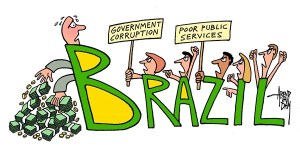
Unlike our soap operas, “telenovelas” in Latin America actually end. And then they come back in reruns. It’s fair to say that the Brazil “telenovela” about corruption is not planning to end soon.
President Lula of Brazil is back in the news. However, this is not the return that he probably had in mind:
Federal prosecutors filed new corruption charges on Monday against Brazil’s former president, Luiz Inácio Lula da Silva, raising pressure on him and his family over dealings in Angola, the oil-rich country where Brazilian companies have aggressively raised their profile over the last decade.The charges are the latest blow to Mr. da Silva, 70, who has been one of Latin America’s most influential politicians.
Lula, as he is known, was the darling of the world not long ago. He was the leftist who allegedly governed from the middle and avoided extremes. They even said that he had the charm of Bill Clinton. He also had Bill Clinton’s incredible good luck with the economy.
Lula is just the latest example of Brazilian crony capitalism. He started as a left center friend of the workers and he is now accused of stealing money and helping the fat cats get rich.
The problem is not Lula per se. He is just the latest politician thrown into a system where corruption runs rampant, as you can see in this long but excellent report:
Corruption represents a constraint to business in Brazil.Corruption is especially likely in the tax administration, public procurement and natural resource sectors.A recent large-scale corruption scandal holds the state-run oil company Petrobras at the center.The Clean Companies Act is one of the toughest anti-corruption laws in the world, but its enforcement is inconsistent. Under the Act, bid rigging and fraud in public procurement, direct and indirect acts of bribery, and attempted bribery of Brazilian public officials and of foreign public officials are illegal. The Act holds companies responsible for the corrupt acts of their employees and introduces strict liability for those offences, meaning a company can be liable without finding of fault. Brazilian law makes no distinction for facilitation payments, meaning companies could be at risk for engaging in such practices. Giving gifts is illegal and not necessary when doing business and establishing relationships. Businesses are advised to consider the Portal’s compliance guide for Brazilian laws.
Crony capitalism sort of works like this: you create a corrupt relationship between politicians, labor union leaders, and businessmen willing to play the game to get market share guarantees. It works real well when commodity prices are high or the economy is booming. Unfortunately, it blows up when the economy slows down, as is the case in Brazil right now.
As we hear from Brazilian friends, or businessmen, corruption is often necessary to get anything done. You can’t get a business license unless you reward the bureaucrat willing to complete the application. You can’t get an appointment with the agency head unless you treat someone to dinner or a trip to Miami depending on the urgency of the issue. In other words, the system is corrupt and the bureaucrats expect you to play.
Brazil is a wonderful country and one of the Top 10 GDPs in the world. At the same time, it is run like a banana republic.
P.S. You can listen to my show (Canto Talk) and follow me on Twitter.
Wed Oct 12: Corruption in Brazil, Putin, Venezuela, Cuba & the US election in weeks....click to listen.... https://t.co/XTW16Yb1ct— Silvio Canto, Jr. (@SCantojr) October 12, 2016
Tags: Impeachment and corruption in Brazil To share or post to your site, click on "Post Link". Please mention / link to the My View by Silvio Canto, Jr. Thanks!